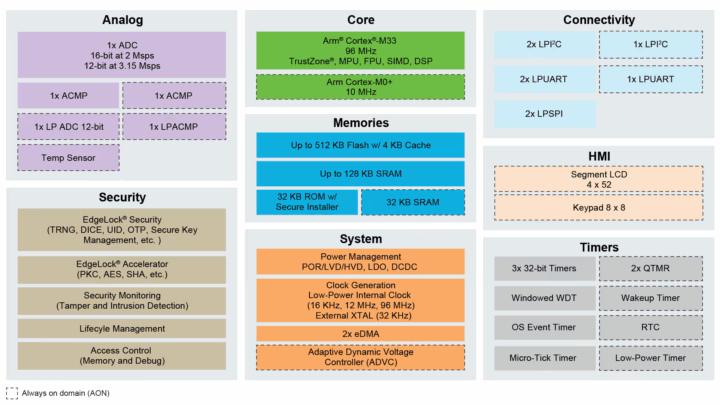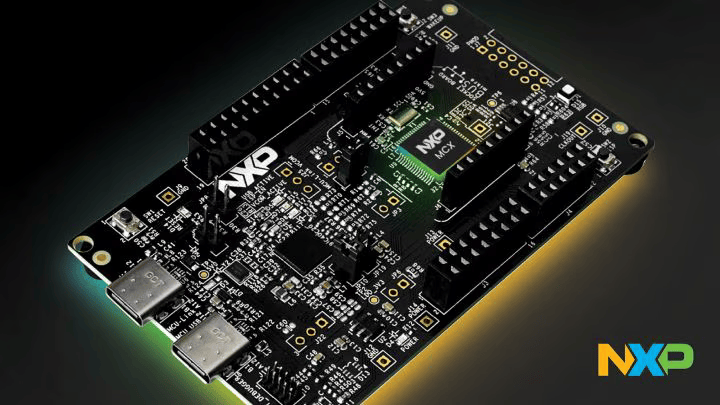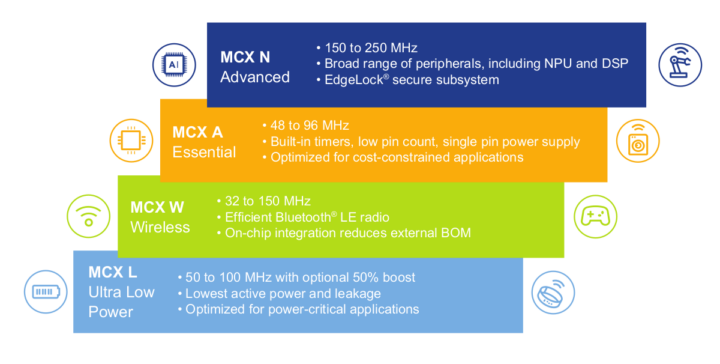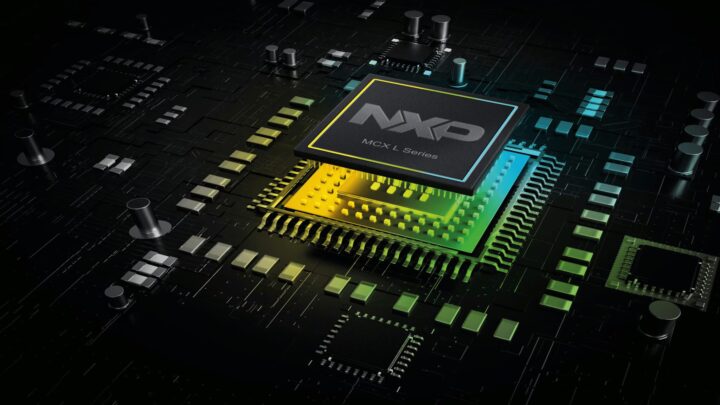NXP Semiconductors has launched the MCX L series of ultra-low-power Arm Cortex-M33 MCUs with the MCX L14x and MCX L25x SKUs. The new series offers similar peripherals as the rest of the MCX portfolio but uses a new “power management architecture that supports always-on, battery-powered applications”
The MCX L series uses a dual domain architecture, with “real-time processing and ultra-low-power sensing functions in a single device.” The Arm Cortex-M33 core supports real-time processing functions while the Arm Cortex-M0+ core offers always-on operation in the ultra-low-power sense domain. The new microcontrollers reportedly use three times less power than their predecessors.
The ultra-low-power series is targeted at energy-constrained applications, powered by a battery, ultracapacitor, or power harvesting circuit. These include building control, industrial sensing, smoke and fire alarms, flow meters, smart appliances, and motion detectors.
NXP MCX L14x and L25x specifications:
- CPU
- Main core: Arm Cortex-M33 microcontroller @ up to 96 MHz (48 MHz for MCX L14x)
- Sensor domain: Arm Cortex-M0+ microcontroller @ up to 10 MHz
- Memory
- MCX L14x
- Up to 256KB flash program memory
- Up to 64KB SRAM
- 32KB ROM with Secure Installer
- MCX L25x
- Up to 512 KB on-chip flash program memory with 4 kB low-power cache and ECC
- Up to 128 KB SRAM
- 32KB ROM with Secure Installer
- MCX L14x
- HMI (L25x only)
-
- 1x Segment LCD 4 x 52 (with 48 LCD pins)
- 1x Keypad supporting up to 8 x 8 pad matrix
-
- Connectivity
- 2x LPSPI (Low Power SPI) modules, @ up to 50 MHz in master mode
- 2x LPI2C (Low Power I2C) supporting Standard, Fast, Fast+ and Ultra-Fast modes
- 3x LPUART (Low Power UART)
- Peripherals
- Analog
- 1x 16-bit ADC, 16-bit at 2.0 Msamples/sec, 12-bit mode at 3.5 MSamples/sec
- 24x ADC input channels with multiple internal and external trigger inputs
- Integrated temperature sensor
- 1x LP 12-bit ADC at 2.0 Msamples/sec
- 2x high-speed comparators with 8 input pins and an 8-bit DAC (1x comparator on L14x)
- 1x low-power analog comparator
- Timers
- 3x 32-bit general-purpose timers/counters
- Up to 2x QTimer (Quad Timer)
- LPTimer (Low Power Timer)
- Frequency measurement timer
- Windowed Watchdog Timer
- Wake timer
- MicroTick timer
- 42-bit free running OS timer as a continuous timebase for the system
- Analog
- Security
- Code Watchdog to ensure code flow integrity
- Edgelock Security with TRNG, OTP, DICE, and secure key management
- Edgelock AES/SHA accelerator
- Three-level read-out protection
- Flash programming through in-system programming (ISP) via LPUA+B28RT interface with automatic baud rate detection
- Glitch attack resistant keyed access (Glikey)
- System
- 2x eDMA (enhanced Direct Memory Access)
- Clock Generation: Low-Power Internal Clock (16kHz, 12MHz, 96MHz)
- Power Management: POR/LVD/HVD, LDO, DCDC
- Packaging
- LQFP100, 14 x 14 x 1.4 mm, 0.5 mm pitch
- VFBGA184 9 x 9 x 1 mm, 0.5 mm pitch

The MCX L series is supported by NXP’s MCUXpresso Developer Experience, which includes core software development kits, multiple IDE options, configuration and debug tools for secure and accelerated deployment. Visual Studio Code, MCUXpresso IDE, IAR, and Keil IDEs are available to choose from. The MCX L supports bare metal applications and is RTOS-capable, with FreeRTOS samples in the SDK and planned support for Zephyr.

NXP offers low-cost FRDM development boards, FRDM-MCXL144 and FRDM-MCXL255, with an onboard programmer/debugger. These boards support rapid prototyping with Arduino and mikroBUS headers, but the company has yet to release other details.
The MCX L series was showcased in a building automation demo at CES 2025. It is still in the preproduction stage, with sampling projected for the first half of 2025 and general availability in the second. Pricing details have yet to be announced. You can visit the NXP website for more information. We also covered the launch of the MCX A Essential family in January 2024, and the high-end MCX N family is also available, so what remains is the official introduction of the MCX W Wireless microcontrollers with a Bluetooth LE radio.

Via Hackster.io

Tomisin is a writer specializing in hardware product reviews, comparisons, and explainers. He is very passionate about small form factor and single-board computers.
Support CNX Software! Donate via cryptocurrencies, become a Patron on Patreon, or purchase goods on Amazon or Aliexpress





